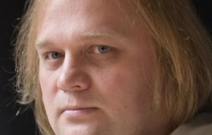TRIBECA FESTIVAL | Punching through “The Fourth Dimension”-REVIEW
Sometime last year Eddy Moretti, co-founder of Vice Magazine’s film division, assigned three movie directors from different countries a fairly abstract project. They were to each shoot a short film about the concept of a fourth dimension, and follow such rules as “the hero needs to be bold,” “the hero also needs to be flawed,” and “a stuffed animal needs to make an appearance.” Moretti also instructed them to make “the best film you’ve ever made.”
The three chosen filmmakers were Harmony Korine (who wrote 1995’s Kids and made his directorial debut with the critically-panned, cult-celebrated Gummo two years later), Russia’s Alexey Fedorchenko (“Silent Souls”) and Polish newcomer Jan Kwiecinski.
Korine’s vignette, essentially a one-joke premise in the vein of “Being John Malkovich”—a celebrity skewering himself and having a field day—is the weakest of the three. Val Kilmer plays a creepy, pot-bellied, long-haired self-help guru named Val Kilmer. Holding court at a neon-lit roller disco, and helped by a crew playing banal sound effects, Kilmer speaks in Al Sharpton-esque cadences, revealing “awesome secrets” about the fourth dimension to his followers. He has visions of aliens, of a cotton candy-like world engulfing humanity. When his speechifying returns to the present, he mainly gives the crowd bad advice (such as “if you find yourself buying a lottery ticket, cut off your finger.”)
[Follow us on TWITTER–we’ve been waiting for you]
Korine annoyingly cross-cuts between these gauche demonstrations and scenes of Kilmer playing violent video games with his considerably younger, dreadlocked girlfriend. Kilmer purports to know all the answers, but outside his act, he’s just an over-the-hill loser, no better than his fans. This is tired stuff, neither insightful nor funny, though it’s somewhat refreshing to see the notoriously self-involved Kilmer cutting loose; with a better script and a director with greater discipline, he could make his own worthwhile version of Being John Malkovich. As for Korine, let’s hope he returns soon to his raison d’être, documentary-like chronicles of freakish, lonesome outsiders.
Faring better—but still overwrought and overwritten—is Fedorchenko’s “Chronoeye,” which follows a gruff, workaholic scientist (Igor Sergeev) obsessed with his time-machine. He’s able to type historic dates and places into his computer, and signal a camera to display footage from that date, but repeatedly, his camera only reveals minutiae before fading to black (attempting to witness the birth of Jesus at Bethlehem, for instance, he only sees a baby cooing at a donkey). He’s angered by this lack of clarity (“I need God’s view, not the view of an ant!” he laments) but eventually learns to stop living in the past, through the help of an intrusive but likable female neighbor. The moral of “live in the present” is a bit overused by now, but Fedorchenko’s particular take on how people can’t see the forest for the trees is clever.
The Vice editing team, happily, saved the best for last. Kwiecinski’s “Fawns,” with scarcely any dialogue and a quartet of fresh-faced young actors at its core, is a consistently fear-provoking portrait of dashed dreams. In a town resembling New Orleans, the citizens have fled due to flood warnings, but four teenagers stubbornly remain. Because televisions, radios, cars and other creature comforts they obsess over are still functioning, the kids are oblivious to the empty streets, ransacked houses, and constant siren sounds. They make this post-apocalyptic universe their own, dancing through playgrounds and churches, pillaging and sexually cavorting wherever they please. Only when they find a trapped handicapped girl do they realize the selfishness of their ways.
The lack of a score in “Fawns” is a remarkably effective device. And Kwiecinski doesn’t pass easy judgment on his profligate characters; we share in their sense of newfound freedom while also raising an eyebrow at their recklessness.
The rest of Fourth Dimension lacks poetry and power in comparison.
Sam Weisberg reviews hard-to-find and out-of-the-way films on his blog Hidden Films.








